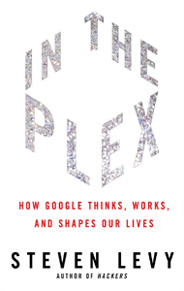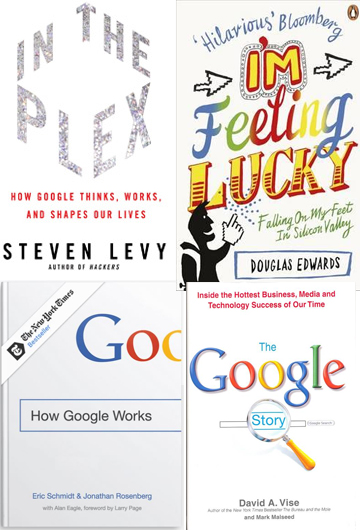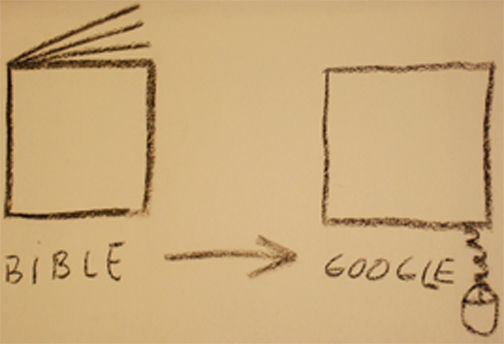Time to finish my account of In the Plex after already four posts. Chapter 5 is about Google in the mobile and in the video. Chapter 6 is about China, a very interesting chapter about Google’s moral dilemmas. Chapter 7 is about the relationships with government.
These chapters show Google is now a mature and serious company, with exceptions:
The keynote did end on a high note. Page had insisted that there be a question period, almost as if he were running a Google TGIF. This was almost unheard of in CES keynotes. The people at Google in charge of the speech came up with an inspired idea: they spent a bundle to book the comedian Robin Williams (a huge Google fan) as Page’s sidekick for the Q and A. The conceit was that Williams would be a human Google. The comic’s manic improvisations made people instantly forget the awkwardness of Page’s presentation. The funniest moment came when a French reporter began to ask a tough question of Page but could not finish due to Williams’s relentless, politically indefensible, and utterly hilarious mocking of the man’s accent and nationality. The unfortunate Frenchman sputtered with rage. The moment fit Google perfectly: corporate presentation turned as anarchic as a Marx Brothers skit. [pages 246-247]
“Sergey and Larry are not kids anymore,” Eric Schmidt noted in early 2010. “They are in their mid-thirties, accomplished senior executives in our industry. When I showed up, they were founder kids— very, very smart, but without the operating experience they have now. It’s very important to understand that they are learning machines and that ten years after founding the company, they’re much more experienced than you’ll ever imagine.” From Schmidt’s comments, it was reasonable to wonder when the inevitable would occur—when Larry Page, now middle-aged and officially seasoned, might once again become Google’s CEO, a job he had been reluctant to cede and gave up only at the VC’s insistence. When asked directly if he was eager to reassume the role, Page refused to engage. “That’s all speculation,” he said. [Page 254]
And the inevitable brain drain would follow
Google didn’t stop recruiting the best people it could find, especially engineers. In fact, the effort became more urgent because there were vacancies at Google created by valued employees who either joined tech firms that were newer and more nimble than Google or started their own companies. And every so often, an early Googler would simply retire on his or her stock-option fortune. The defections included high-ranking executives and—perhaps scarier to the company—some of its smartest young engineers. The press labeled the phenomenon Google’s “brain drain.” Sheryl Sandberg, who had built up the AdWords organization, left to become the chief operating officer at Facebook. Tim Armstrong left his post as head of national sales to become CEO of AOL. (“We spent all of Monday convincing him to stay,” said the grim Sergey Brin at that next week’s TGIF, expressing well wishes toward its valuable sales manager.) Gmail inventor Paul Buchheit joined with Bret Taylor (who had been product manager for Google Maps) to start a company called FriendFeed. Of the eighteen APMs—Google’s designated future leaders—who had circled the globe with Marissa Mayer in the summer of 2007, fewer than half were still with the company two years later. All of them left with nothing but respect and gratitude for Google—but felt that more exciting opportunities lay elsewhere. Bret Taylor, while specifying that he cherished his time at Google, later explained why he’d left. “When I started at the company, I knew everyone there,” he said. “There’s less of an entrepreneurial feel now. You have less input on the organization as a whole.” When he announced his departure, a procession of executives came to his desk asking him to reconsider. “I didn’t know Google had so many VPs,” he said. But he’d made his mind up. [Page 259]
Really reaching maturity?
Eric turned to him and said, “Okay, Larry, what do you want to do? How fast do you want to grow?” “How many engineers does Microsoft have?” asked Page. About 25,000, Page was told. “We should have a million,” said Page. Eric, accustomed to Page’s hyperbolic responses by then, said, “Come on, Larry, let’s be real.” But Page had a real vision: just as Google’s hardware would be spread around the world in hundreds of thousands of server racks, Google’s brainpower would be similarly dispersed, revolutionizing the spread of information while speaking the local language. [Page 271]
Failure in China
China has been Google deepest failure. Despite efforts and (too much?) compromise, Google has never really succeeded in China. Chapter 6 is another must read. Brin who has always been the most sensitive to human rights “went as far” as abstaining at a shareholder meeting.
During the Google annual shareholders meeting on May 8, 2008, Brin took the rare step of separating himself from Page and Schmidt on the issue. Shareholders unhappy with Google censorship in China had forwarded two proposals to mitigate the misdeed. The first, organized by Amnesty International and submitted by the New York state pension fund, which owned 2 million shares of Google, demanded a number of steps before the company engaged in activities that suppressed freedom. The second would force the board of directors to set up a committee focusing on human rights. Google officially opposed the proposals, and with a voting structure that weighted insider shares ten times as heavily as those owned by outside investors, the proposals were easily defeated. But Brin abstained, sending a signal—though maybe only to himself—that his conscience would no longer permit him to endorse the company’s actions in China unreservedly. When shareholders had a chance to question Google’s leaders, Brin explained himself: “I agree with the spirit of both of these, particularly in human rights, freedom of expression, and freedom to receive information.” He added that he was “pretty proud of what we’ve been able to achieve in China” and that Google’s activities there “honored many of our principles.” But not all.
It was a clear sign that Brin no longer believed in Google’s China strategy. Another signal was the fact that after Google China was established, and despite Kai-Fu Lee’s urging, neither Brin nor Page ever crossed the threshold of their most important engineering center abroad. Even in mid-2009, when the pair decided to fly their private Boeing 767-200 to the remote Eniwetok Atoll in the Pacific Ocean to view a solar eclipse and Brin used the occasion to drop in on Google Tokyo, they skipped China. Still, Google was reluctant to defy the government of China. There was still hope that things would turn around. In addition, its business operations in China were doing well. Though it had far to go to unseat Baidu, Google was clearly in second place and more than holding its own. In maps and mobile Google was a leader. In the world’s biggest Internet market, Google was in a better position than any other American company. [Page 305]
Finally…
“The security incident, because of its political nature, just caused us to say ‘Enough’s enough,’” says Drummond. The next day Drummond wrote a blog item explaining Google’s decision. It was called “A New Approach to China.” He outlined the nature of the attack on Google and explained that it had implications far beyond a security breach; it hit the heart of a global debate about free speech. Then he dropped Google’s bombshell:
These attacks and the surveillance they have uncovered— combined with the attempts over the past year to further limit free speech on the web—have led us to conclude that we should review the feasibility of our business operations in China. We have decided we are no longer willing to continue censoring our results on Google.cn, and so over the next few weeks we will be discussing with the Chinese government the basis on which we could operate an unfiltered search engine within the law, if at all. We recognize that this may well mean having to shut down Google.cn, and potentially our offices in China.
On January 12, Google published the Drummond essay on its blog. The news spread through Mountain View like an earthquake. Meetings all over the campus came to a dead stop as people looked at their laptops and read how Google was no longer doing the dirty work of the Chinese dictatorship. “I think a whole generation of Googlers will remember exactly where they were when that blog item appeared,” says one product manager, Rick Klau. [Page 311]
And according to Wikipedia, https://en.wikipedia.org/wiki/Google_China “As of November 2013, its search share has declined to 1.7% from its August 2009 level of 36.2%”.
Google and Politics
By late 2007, Barack Obama already had an impressive Google following. Andrew McLaughlin, Google’s policy chief, was advising the senator on tech issues. The product manager for Blogger, Rick Klau, had lived in Illinois and had operated Obama’s blog when the politician ran for the Senate (he’d even let Obama use his house for a fundraiser). Eric Schmidt was the candidate’s official host. [Page 316]
In an ideal world: “I think of them as Internet values. They’re values of openness, they’re values of participation, they’re values of speed and efficiency. Bringing those tools and techniques into government is vital.” [Page 322]
But the reality is tougher: “The job was frustrating. Google hadn’t been perfect, but people got things done—because they were engineers. One of the big ideas of Google was that if you gave engineers the freedom to dream big and the power to do it—if you built the whole operation around their mindset and made it clear that they were in charge—the impossible could be accomplished. But in the government, even though Stanton’s job was to build new technologies and programs, “I didn’t meet one engineer,” she says. “Not one software engineer who works for the United States government. I’m sure they exist, but I haven’t met any. At Google I worked with people far smarter and creative than me, and they were engineers, and they always made everyone else look good. They’re doers. We get stuck in the government because we really don’t have a lot of those people.” [Page 323]
Final thought: Is Google evil?
This is a debate I often have with friends and colleagues. You’ve seen my fascination and I love the way Google tries, explores and changes our world. Still, one may see things differently. As an example, here are some quotes about Google Print.
Maybe the care that Google took to hide its activity was an early indicator of trouble to come. If the world would so eagerly welcome the fruits of Ocean [Google Print code name], what was the need for such stealth? The secrecy was yet another expression of the paradox of a company that sometimes embraced transparency and other times seemed to model itself on the NSA. In other areas, Google had put its investments into the public domain, like the open-source Android and Chrome operating systems. And as far as user information was concerned, Google made it easy for people not to become locked into using its products. […] It would seem that book scanning was a good candidate for similar transparency. If Google had a more efficient way to scan books, sharing the improved techniques could benefit the company in the long run—inevitably, much of the output would find its way onto the web, bolstering Google’s indexes. But in this case, paranoia and a focus on short-term gain kept the machines under wraps. “We’ve done a ton of work to try to make those machines an order of magnitude better,” AMac said. “That does give us an advantage in terms of scanning rate and cost, and we actually want to have that advantage for a while.” Page himself dismissed the argument that sharing Google’s scanner technology would help the business in the long run, as well as benefit society. “If you don’t have a reason to talk about it, why talk about it?” he responded. “You’re running a business, and you have to weigh [exposure] against the downside, which can be significant.” [Page 354-55]
But not all of the publishers found Google charming. Jack Romanos, then CEO of Simon & Schuster, later complained to New York’s John Heilemann about Google’s “innocent arrogance” and “holier-than-thou” attitude. “One minute they’re pretending to be all idealistic, talking about how they’re only in this to expand the world’s knowledge, and the next they’re telling you that you’re going to have to do it their way or no way at all.” [Page 357]
[There] was the conviction that in a multimillion-dollar enterprise such as Book Search it was unconscionable for authors and publishers not to be paid. After the debate, Aiken laid out the essence of his group’s rationale to an Authors Guild member who told him that he’d like his books discoverable by Google. “Don’t you understand?” Aiken said. “These people in Silicon Valley are billionaires, and they’re making money off you!” [Page 360]
Google has missed opportunities such as in social networking. Orkut, then Wave, Dodgeball, Buzz replaced by Google + were more beta tests and then a reaction to Facebook. Google often tries things without much effort and checks if traction comes or not. But its ambition has not really slowed down: “Michigan had already begun digitizing some of its work. “It was a project that our librarians predicted would take one thousand years,” Coleman later said in a speech. “Larry said that Google would do it in six.” [Page 352]
Indeed Page had dreamed about digitizing books already at Stanford and in the early days of Google, he began playing with scanners, helped by Marissa Meyer: “The first few times around were kind of sloppy, because Marissa’s thumb kept getting in the way. Larry would say, “Don’t go too fast … don’t go too slow.” It had to be a rate that someone could maintain for a long time—this was going to scale, remember, to every book ever written. They finally used a metronome to synchronize their actions. After some practice, they found that they could capture a 300- page book such as Startup in about forty-two minutes, faster than they expected. Then they ran optical character recognition (OCR) software on the images and began searching inside the book. Page would open the book to a random page and say, “This word—can you find it?” Mayer would do a search to see if she could. It worked. Presumably, a dedicated machine could work faster, and that would make it possible to capture millions of books. How many books were ever printed? Around 30 million? Even if the cost was $10 a book, the price tag would only be $300 million. That didn’t sound like too much money for the world’s most valuable font of knowledge.” [Page 360] (Google Print is now Google Books – https://en.wikipedia.org/wiki/Google_Books)
In 2011, Page ambition is still there. He is now the CEO. In late 2010, “Sergey Brin had repeated the sentiment: ‘We want Google to be the third half of your brain’ “. [Page 386]
“I just feel like people aren’t working enough on impactful things,” Page said. “People are really afraid of failure on things, and so it’s hard for them to do ambitious stuff. And also, they don’t realize the power of technological solutions to things, especially computers.” He went on to rhapsodize about big goals like driving down the price of electricity to three cents a watt—it really wouldn’t take all that much in resources to launch a project to do that, he opined. In general, society wasn’t taking on enough big projects, according to Page. At Google, he said, when his engineers undertook a daunting, cutting-edge project, there were huge benefits, even if the stated goal of the project wasn’t accomplished. He implied that even at Google there wasn’t enough of that ambition. “We’re in the really early stages of all of this,” he said. “And we’re not yet doing a good job getting the kinds of things we’re trying to do to happen quickly and at scale.” [Page 387]
I just finished In the Plex and I kind of feel sad. It is a book I wish I would never have finished reading. I have now read four books about Google. In fact, we are far from the end. It may even be just the beginning as Page and Brin seem to believe and I will probably read other books abotu Google in the future. As good as this one? Only the future will tell… but i will finish here with a 2007 post.



